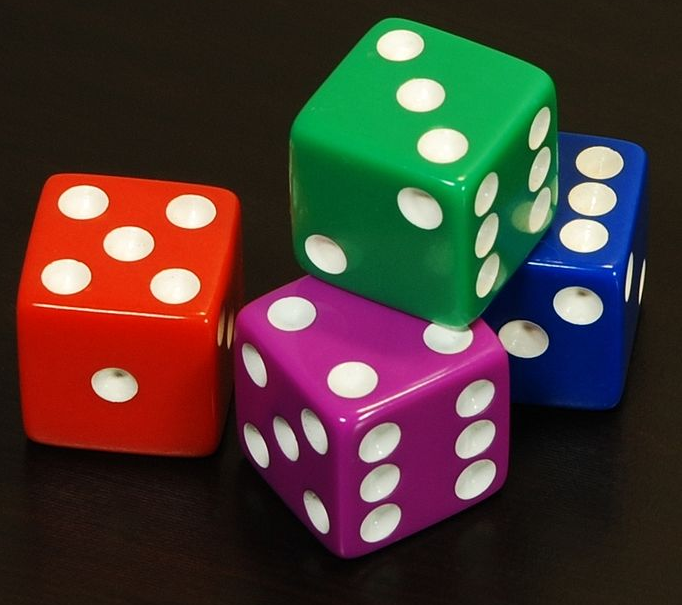Dice Rolls
The DICE ROLLS calculator simulates Dice Rolls for table top gaming. This calculator allows you to generate "rolls" for different dice which have 4, 6, 8 10, 12, 20, or 100 possible outcomes.
~ Derived from Calculator by JustinLiller
APPLICATIONS:
The regular polyhedra that represent physical dice designs are constructed only with equal-sized regular polygons so that rolling the dice has the same possibility of landing on any of the faces. This calculator provides an equivalent simulation, since all clicks of a button on the calculator generate a random number in the range of the dice, where any of the numbers has an equal chance of being generated.
To roll more than one dice, just click the calculator button repeatedly. For example, to roll two standard six-sided dice, click the button labelled "roll dice with six possibilities" twice, generating two numbers. The two rolls will be independent.
 [1]
[1]
PHYSICAL EXAMPLES:
The following shapes, all convex polyhedra, have the requisite number of regular-polygon sides to support various physical dice designs:
- tetrahedron -- a 4-sided dice that has four equilateral triangular faces.
- cube -- a 6-sided dice that (like pictured above) that has six square faces
- octahedron -- an 8-sided dice that has eight equilateral triangular faces
- dodecahedron -- a 12-sided dice that has twelve regular pentagonal faces
- icosahedron -- a 20 sided dice that has twenty equilateral triangular faces
       |
HISTORY:
The dots on the marked faces of a typical gambling dice are called "pips. The most common gambling dice has six faces and thus from 1 through 6 pips represented on each face.
The oldest known dice were excavated as part of a 5000-year-old backgammon set at the Burnt City, an archeological site in south-eastern Iran.[2]

Virtual Dice
- Roll Five Virtual Cube Dice
- Roll Four Virtual Cube Dice
- Roll Three Virtual Cube Dice
- Roll Two Virtual Cube Dice
- Roll a 100-sided Virtual Dice
- Roll a 50-sided Virtual Dice
- Roll a 20-sided Virtual Dice
- Roll a 12-sided Virtual Dice
- Roll a 10-sided Virtual Dice
- Roll a 9-sided Virtual Dice
- Roll a 8-sided Virtual Dice
- Roll a 7-sided Virtual Dice
- Roll a 6-sided Virtual Dice
- Roll a 5-sided Virtual Dice
- Roll a 4-sided Virtual Dice
- Roll a 3-sided Virtual Dice
- Roll a 2-sided Virtual Dice
- Flip a coin
REFERENCE:
[1] 6sided dice (picture)
Source: Wikipedia; User: Dicrictica
URL: http://en.wikipedia.org/wiki/Dice#mediaviewer/File:6sided_dice.jpg
Public License: CC Attribution-ShareAlike 3.0 Unported
modified: yes, cropped
[2] Dice
Source: Wikipedia
URL: http://en.wikipedia.org/wiki/Dice
Public License: CC Attribution-ShareAlike 3.0 Unported
Equations and Data Items
- Comments
- Attachments
- Stats
No comments |
